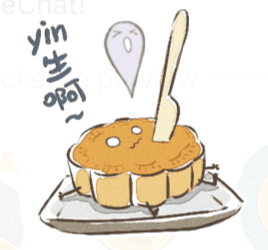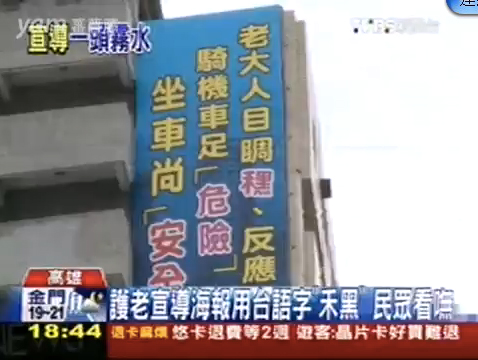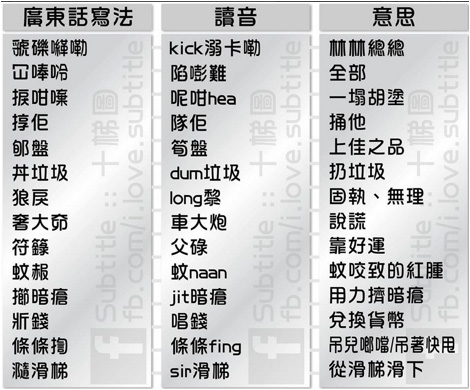Archive for Topolects
January 14, 2016 @ 8:00 am· Filed by Victor Mair under Names, Topolects, Writing systems
Not too long ago, we looked at some "Difficult Taiwanese characters" (11/8/15). By "difficult Taiwanese characters", I am referring to sinographs that literate Mandarin speakers are unfamiliar with.
The same situation obtains for Cantonese. See, for example:
"Cantonese and Mandarin are two different languages " (9/25/15)
"Cantonese novels " (8/20/13)
"Hong Kong Multilingualism and Polyscriptalism " (7/26/10)
"Mutual Intelligibility of Sinitic Languages " (3/6/09)
Read the rest of this entry »
Permalink
January 3, 2016 @ 11:56 am· Filed by Victor Mair under Language and culture, Language and the movies, Topolects, Transcription, Translation
Over at China Economic Review, Hudson Lockett has written an interesting piece worthy of the celebrated British sleuth:
"The game is afoot! Why Chinese Sherlock fans are as confused as everyone else" (1/3/16)
It's all about how the Chinese term — mǎtí nèifān zú 马蹄内翻足 — for a congenital deformity referred to in English as "clubfoot" (talipes equinovarus [CTEV]) figures in the "slaveringly awaited"
New Year’s Day special episode of the series starring
Read the rest of this entry »
Permalink
December 26, 2015 @ 11:23 pm· Filed by Victor Mair under Linguistics in the comics, Topolects, Vernacular
Listen to what the Chinese scout in this video says at :43. My first impression was that it sounds like he is speaking Cantonese, not Mandarin.
https://www.youtube.com/watch?v=TRIdJCzCpOg
Read the rest of this entry »
Permalink
December 10, 2015 @ 2:21 pm· Filed by Victor Mair under Borrowing, Signs, Topolects, Writing
Ryan Kilpatrick has an interesting article in Hong Kong Free Press:
"Taiwan city promises to ‘correct’ simplified road sign after public outcry" (12/7/15)
It includes this photograph, which illustrates some of the problems:

Read the rest of this entry »
Permalink
December 3, 2015 @ 7:02 am· Filed by Victor Mair under Borrowing, Grammar, Topolects, Writing systems
Andrew Peters noticed an interesting aspect of the concise little figure in this article: "Evolution of the first person pronoun in Japanese spoken language" (click to nicely embiggen). It claims to show which pronouns were in use in various eras (Nara [710–794], Heian [794–1185], Kamakura [1185–1333], Muromachi [1336–1573], Edo [1603–1868], Meiji/Taisho/Showa [1868-1989], and postwar). What Andrew discovered is that the two casual masculine pronouns ore おれ (俺) (this may even sound rude) and boku ぼく(僕) are, respectively, the oldest and newest pronouns in use today.
Read the rest of this entry »
Permalink
November 24, 2015 @ 5:31 am· Filed by Victor Mair under Names, Topolects
From Bob Bauer:
A couple of days ago I discovered one of your Language Logs from last year that had a very interesting and very long back-and-forth discussion on the distinctive characteristics of Hong Kong's Chinese language.* I noticed.one commenter with initials HL** mentioned some particularly interesting things about the use of the term Punti 本地話*** to mean "Cantonese" in HK's law courts. Historically, Punti had referred to the indigenous Cantonese in contrast to the more recently-arrived Hakka immigrants. (By the way, for what it's worth, in the first half of the 19th century 地 was pronounced [ti], and then in the late 19th/early 20th century it diphthongized to [tei]).
Read the rest of this entry »
Permalink
November 15, 2015 @ 11:43 am· Filed by Victor Mair under Humor, Pronunciation, Proverbs, Topolects
Chris P sent in the following emojis from WeChat:


Read the rest of this entry »
Permalink
November 8, 2015 @ 9:40 pm· Filed by Victor Mair under Topolects, Words words words, Writing
[This is a guest post by Michael Cannings]
This brief news segment features a poster with a lot of interesting points packed into three short lines of text. The billboard is a traffic safety announcement by police in Kaohsiung, southern Taiwan.

[Screengrab with most of the text visible]
Read the rest of this entry »
Permalink
October 29, 2015 @ 6:00 am· Filed by Victor Mair under Language and culture, Topolects
Chuin-Wei Yap has an interesting article about the southern conurbation known as Chaoshan in China Real Time: "Underground Banks Trace Roots to the Sicily of China" (WSJ, 10/27/15).
Chaoshan is a portmanteau name composed of the first syllables of the two main cities that it encompasses: Chaozhou (Teochew) and Shantou (Swatow).
I have long been intrigued by Chaoshan because of its rich history and the abundance of outstanding people who came from this area, including Li Ka-shing (the richest man in Asia; b. July 29, 1928) and my old friend, Jao Tsung-I 饒宗頤 (b. August 9, 1917), whom I consider to be the greatest living Chinese scholar, with a phenomenal breadth of learning and talent, despite the fact that he is basically an autodidact. I am also partial to Chaozhou because it is the home of one of China's most distinguished operatic traditions and gongfu tea, about which I wrote this very long blog post.
Read the rest of this entry »
Permalink
October 28, 2015 @ 5:40 pm· Filed by Victor Mair under Signs, Topolects, Translation
Andrew Herron sent in this photograph taken on Hospital Road, Hong Kong Island:

Read the rest of this entry »
Permalink
October 15, 2015 @ 7:37 am· Filed by Victor Mair under Classification, Topolects
The first comment to my post on "Multilingual voting signs" (11/9/12) was by Alinear, who stated that cǐ chù 此處 ("this place") sounds like Cantonese to him. As a matter of fact, as reader ahkow pointed out in the second comment, cǐ chù 此處 ("this place") is simply the literary / classical Chinese way of writing "here". Both cǐ 此 ("this") and chù 處 ("place") occur on the oracle bones, so this means that they have been a part of Sinitic vocabulary since around 1200 BC. Where they might have come from before that time remains to be determined.
Read the rest of this entry »
Permalink
October 12, 2015 @ 7:40 am· Filed by Victor Mair under Language and education, Language preservation, Multilingualism, Topolects
Hakka (Kèjiā 客家 ["guest families"]) is the name of a Chinese ethnic group and their language. Their name refers to the fact that, although they came from the north centuries ago, they are now scattered in various locations throughout South China and, indeed, the world.
Although the Hakka amount to approximately only 4% of the total population of China, their influence on politics, the military, culture, and other spheres of life in the past two centuries has been disproportionately large
Read the rest of this entry »
Permalink
September 25, 2015 @ 4:01 pm· Filed by Victor Mair under Topolects, Writing
From Mengnan Zhang:
I found this very interesting image on Facebook. The three columns stand for how to write various terms in Cantonese, their pronunciation, and the meaning of the words listed. As a native speaker of Mandarin, I have no idea what these words are talking about even after reading the meaning of each. Linked back to what our professor had talked about in class, Cantonese is a language, which both script and speech have no correspondence with Mandarin at all.

Read the rest of this entry »
Permalink





